Get a Gun is More Easy That Get a House
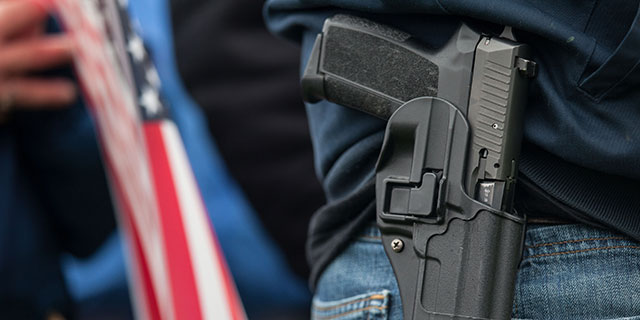
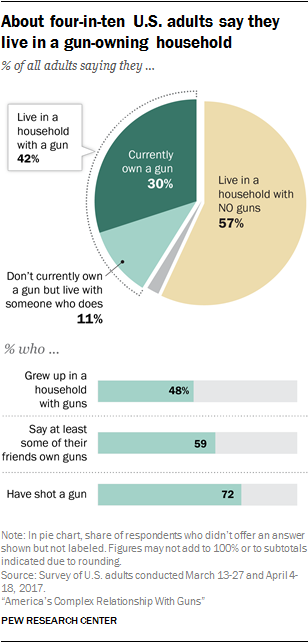
As a nation, the U.S. has a deep and enduring connection to guns. Integrated into the fabric of American society since the country's earliest days, guns remain a point of pride for many Americans. Whether for hunting, sport shooting or personal protection, most gun owners count the right to bear arms as central to their freedom. At the same time, the results of gun-related violence have shaken the nation, and debates over gun policy remain sharply polarized.
A new Pew Research Center survey attempts to better understand the complex relationship Americans have with guns and how that relationship intersects with their policy views.
The survey finds that Americans have broad exposure to guns, whether they personally own one or not. At least two-thirds have lived in a household with a gun at some point in their lives. And roughly seven-in-ten – including 55% of those who have never personally owned a gun – say they have fired a gun at some point. Today, three-in-ten U.S. adults say they own a gun, and an additional 36% say that while they don't own one now, they might be open to owning a gun in the future. A third of adults say they don't currently own a gun and can't see themselves ever doing so.
To be sure, experiences with guns aren't always positive: 44% of U.S. adults say they personally know someone who has been shot, either accidentally or intentionally, and about a quarter (23%) say they or someone in their family have been threatened or intimidated by someone using a gun. Half see gun violence as a very big problem in the U.S. today, although gun owners and non-owners offer divergent views on this.
Gun owners and non-owners are also deeply divided on several gun policy proposals, but there is agreement on some restrictions, such as preventing those with mental illnesses and those on federal watch lists from buying guns. Among gun owners, there is a diversity of views on gun policy, driven in large part by party affiliation.
The nationally representative survey of 3,930 U.S. adults, including 1,269 gun owners, was conducted March 13 to 27 and April 4 to 18, 2017, using the Pew Research Center's American Trends Panel.1 Among the key findings:
The ties that bind gun owners to their firearms are often deep
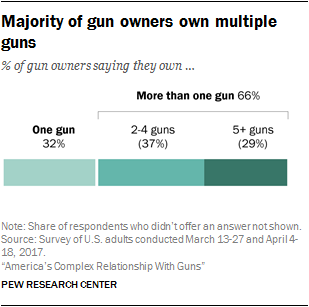
A majority of gun owners (66%) own multiple firearms, and about three-quarters (73%) say they could never see themselves not owning a gun.
Many American gun owners exist in a social context where gun ownership is the norm. Roughly half of all gun owners (49%) say that all or most of their friends own guns. In stark contrast, among those who don't own a gun, only one-in-ten say that all or most of their friends own guns.
Experience with guns starts relatively early particularly for those who grew up in a gun-owning household. Men who grew up in a household with guns and who have ever shot a gun report that they first fired a gun when they were, on average, 12 years old. Among women who grew up in gun-owning households and who have ever shot a gun, the average age at which they first fired a gun is 17. Men tend to become gun owners at an earlier age than women: 19 years old, on average, vs. 27 years old for women.
For most gun owners, owning a firearm is tied to their personal freedom
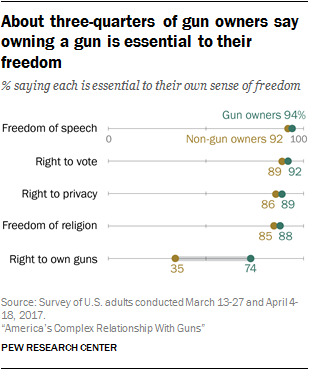
One key and defining characteristic of gun owners is the extent to which they associate the right to own guns with their own personal sense of freedom – 74% of gun owners say this right is essential, compared with only 35% of non-gun owners who say the same.
While the right to own guns is highly valued by most gun owners, not all gun owners see gun ownership the same way. Half of all gun owners say owning a gun is important to their overall identity – with 25% saying this is very important and another 25% calling it somewhat important. Three-in-ten gun owners say owning a gun is not too important to their identity and 20% say it's not at all important.
White men are especially likely to be gun owners, but ownership crosses demographic boundaries
About half of white men (48%) say they own a gun. By comparison, about a quarter of white women and nonwhite men (24% each) own guns, along with 16% of nonwhite women. 2 There is also an education gap in gun ownership and that, too, is particularly pronounced among whites: 41% of whites without a bachelor's degree are gun owners, compared with about a quarter of whites with at least a bachelor's degree (26%).
Geographically, gun ownership is less concentrated in the Northeast than in other regions in the country, and there is a vast urban-rural divide across regions. Among adults who live in rural areas, 46% say they own a gun. By comparison, 28% of adults who live in the suburbs and even fewer – 19% – in urban areas own a gun.
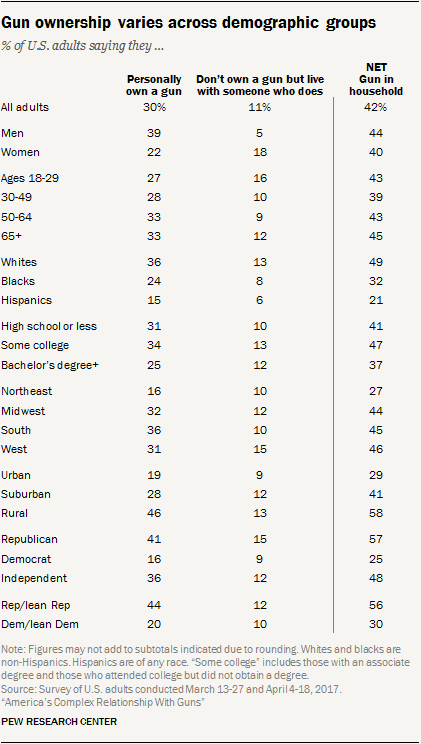
Male gun owners tend to be more immersed in gun culture than their female counterparts
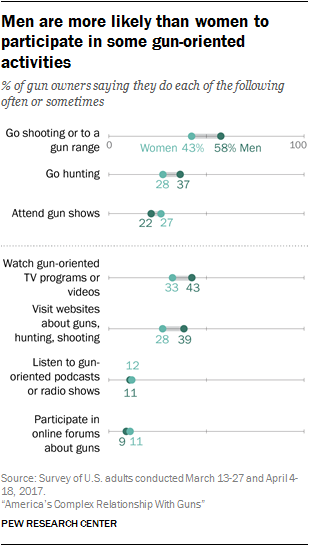
From hunting and shooting to visiting gun-related websites and watching gun-oriented TV programs, there are many activities available to gun enthusiasts. About half of gun owners (52%) say they go shooting or to a gun range often or sometimes; 34% go hunting and 24% attend gun shows at least sometimes.
When it comes to gun-oriented media, roughly four-in-ten gun owners (39%) report that they at least sometimes watch TV shows and videos about guns, and 35% visit websites about guns, hunting or other shooting sports. Gun-related podcasts, radio shows and online discussion forums are less popular: About one-in-ten gun owners say they listen to gun-oriented podcasts or radio shows (11%) or participate in online discussion forums about guns (10%) at least sometimes.
Male gun owners are more likely than women who own guns to engage in some of these activities. For example, 58% of men who own guns say they go shooting or to a gun range at least sometimes, compared with 43% of female gun owners. Men also hunt at higher rates than women and watch more gun-oriented TV shows or videos.
Consistent with their more frequent engagement in gun-related activities, male gun owners are more socially connected to other gun owners than their female counterparts: 54% of men who own guns say all or most of their friends are also gun owners, while 40% of women say the same.
Protection tops the list of reasons for owning a gun
Two-thirds of gun owners say protection is a major reason they own a gun. By comparison, about four-in-ten (38%) cite hunting as a major reason and three-in-ten cite sport shooting, including target shooting, trap and skeet. Fewer point to a gun collection (13%) or to their job (8%) as being central to why they own a gun. To be sure, for many gun owners, these reasons overlap: 44% offer more than one major reason for owning a gun.
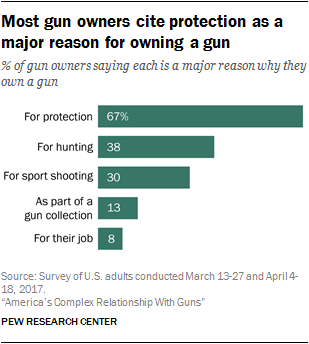
Roughly one-in-seven adults who own or have owned a gun (15%) say they have fired or threatened to fire a gun to defend themselves, their family or their possessions.
Regardless of the reasons for owning a gun, most gun owners don't think their having a firearm is public business, but they also aren't going out of their way to hide the fact that they own a gun. Eight-in-ten gun owners say they don't mind if other people know they own a gun, but they don't set out to tell them; 14% say they'd rather other people not know that they have a firearm, and 6% actively do want others to know.
For many gun owners, a gun is often close at hand
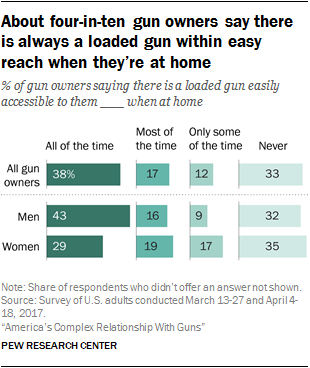
Roughly four-in-ten gun owners (38%) say there is a gun that is both loaded and easily accessible to them all of the time when they're at home. Men are especially likely to have a loaded gun at the ready: 43% of male gun owners vs. 29% of women who own guns say a loaded gun is always easily accessible.
Overall, about seven-in-ten gun owners say they own a handgun or a pistol (72%), while 62% say they own a rifle and 54% own a shotgun. Handguns are more common among those who own a gun for protection.
Among those who own a handgun, about one-in-four (26%) say they carry their gun with them outside of their home all or most of the time, a share that rises to 41% among those who think of their local community as unsafe.
When it comes to gun safety in homes with children, there are some areas of agreement about key precautions
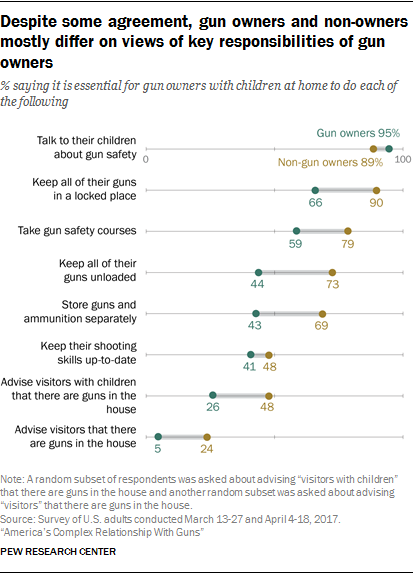
Of the many possible safety precautions gun owners could take when they live with children in the home, three receive majority support from both non-owners and those who currently own a firearm. Nearly all gun owners (95%) believe that talking to children about gun safety is essential, followed by 66% who say all guns should be kept in a locked place when there are children living in the home, and 59% who say gun owners who are parents should take a gun safety course. Majorities of non-gun owners also say these are essential measures for gun owners with children in the home.
The majority of Americans who don't own guns feel it is also essential for gun owners with children living in the home to keep their guns unloaded and in a separate spot from the ammunition. Gun owners disagree. Majorities say these measures are either important but not essential or not important, even in households with children.
When asked about their own habits, roughly half of gun owners with children under 18 living at home say all of the guns in their home are kept in a locked place (54%) and all are unloaded (53%).
Still, many gun owners with children say at least some of their guns are kept unlocked and loaded. In fact, 30% of these gun owners say there is a gun that is both loaded and easily accessible to them all of the time when they're at home.
Americans who own guns largely disagree with non-owners on gun policy, but some proposals have support from both groups
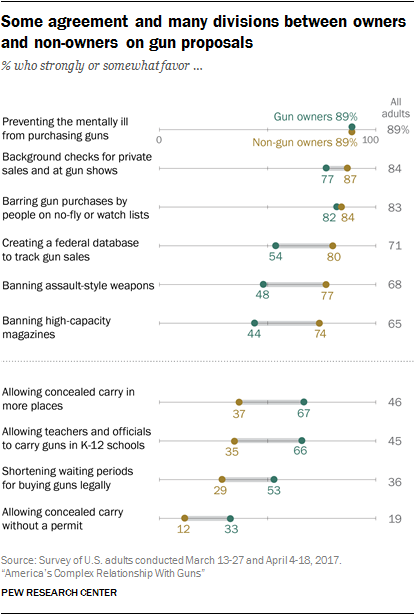
Solid majorities of both gun owners and non-owners favor limiting access to guns for people with mental illnesses and individuals who are on the federal no-fly or watch lists (82% or higher favor among each group). In addition, strong majorities favor background checks for private sales and at gun shows (77% among gun owners and 87% among non-owners).
The groups are more divided when it comes to three other policy proposals: creating a federal database to track gun sales; banning assault-style weapons; and banning high-capacity magazines. Even so, significant shares of gun owners are open to these proposals. Roughly half of gun owners (54%) say they would favor creating a federal database, and 48% favor a ban on assault weapons. Some 44% of gun owners favor banning high-capacity magazines. Support for these proposals is much higher among non-gun owners, with about three-quarters or more saying they would support each of these proposals.
At the same time, majorities of gun owners favor proposals that would expand gun rights, such as allowing people to carry concealed guns in more places and allowing teachers and school officials to carry guns in K-12 schools – proposals that are each supported by only about a third of non-owners.
Even among gun owners, Republicans and Democrats don't see eye to eye on gun policy
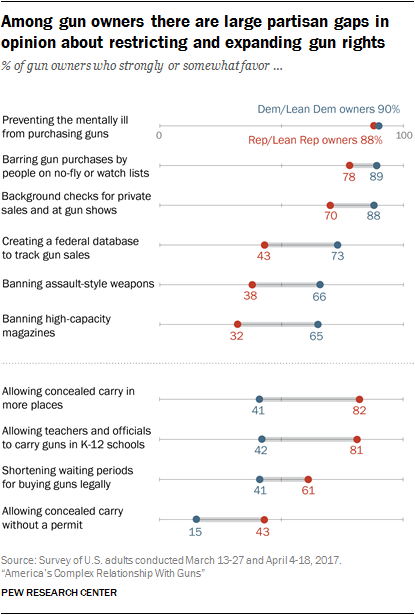
There is a partisan divide in gun ownership: More than four-in-ten Republicans and Republican-leaning independents are gun owners (44%), compared with 20% of Democrats and independents who lean Democratic.
There is also a partisan divide on views of gun policy, and these differences remain even after controlling for gun ownership. For example, Republican gun owners are much more resistant than Democratic gun owners to creating a database to track gun sales and banning assault-style weapons and high-capacity magazines. On the flip side, Republicans are also more open to proposals that would expand gun rights. A prime example: 82% of Republican gun owners favor expanding concealed carry laws to more places, compared with 41% of their Democratic counterparts.
Republican gun owners are about twice as likely as Democratic gun owners to say owning a gun is essential to their freedom (91% vs. 43%), and there are also behavioral differences between these two groups. For example, Republican handgun owners are more likely than their Democratic counterparts to say they carry their gun with them, even if only some of the time (63% vs. 45%). Fully 55% of Democrats who own a handgun say they never carry.
At the most basic level, gun owners and non-owners disagree on the extent to which gun violence is a problem in the U.S.
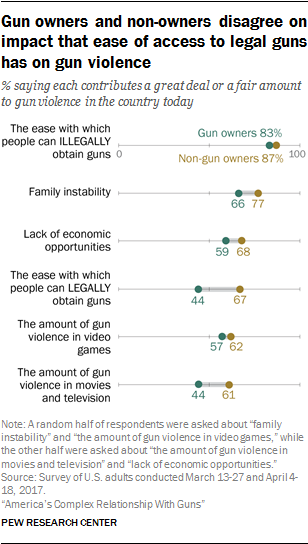
Half of Americans describe gun violence as a very big problem in the United States, but the perceptions of gun owners and those who don't own guns differ considerably. While a majority of those who do not own guns (59%) see gun violence as a major problem in the country today, a third of adults who own guns say this is a very big problem. Democrats and Republicans also offer different assessments, with Democrats far more likely to describe gun violence as a very big problem, and the partisan divide remains when controlling for gun ownership.
Americans see many factors as playing a role in gun violence in the country today. Fully 86% say the ease with which people can illegally obtain guns contributes to gun violence a great deal or a fair amount; more than half say the same about family instability (74%), lack of economic opportunities (65%), the amount of gun violence in video games (60%), the ease with which people can legally obtain guns (60%), and the amount of gun violence in movies and television (55%).
Gun owners and non-owners alike point to the ease with which people can illegally obtain guns as a major contributor to gun violence in the U.S., but opinions diverge when it comes to guns obtained legally. Two-thirds of non-gun owners see the ease with which people can legally obtain guns as contributing at least a fair amount to gun violence; less than half (44%) of gun owners share this view.
It follows that non-gun owners are much more likely than gun owners to say further restricting legal gun sales would result in fewer mass shootings (56% vs. 29%); and non-gun owners are also more likely to say an increase in gun ownership would lead to more crime overall (44% vs. 13%). For their part, 54% of gun owners say there would be less crime if more people owned guns, and 33% say it wouldn't make much difference.
About a quarter of U.S. adults say they or someone in their family have been threatened or intimidated by someone using a gun
Many Americans (44%) say they personally know someone who has been shot, either accidentally or intentionally. This is particularly common among black adults, 57% of whom say they know someone who has been shot; about four-in-ten whites (43%) and Hispanics (42%) say the same.
Higher share of gun owners (51%) than non-owners (40%) report that they know someone who has been shot, either accidentally or intentionally.
Separately, about a quarter of Americans (23%) – including roughly equal shares of gun owners and non-owners – say they or someone in their family have been threatened or intimidated by someone using a gun. Again, blacks are more likely than whites to say they have had this experience: About a third of blacks (32%) say they or someone in their family have been threatened or intimidated by someone with a gun, compared with 20% of whites. About a quarter of Hispanics (24%) say this has happened to them or to someone else in their family.
Roughly one-in-five gun owners belongs to the NRA
Overall, 19% of all U.S. gun owners say they belong to the NRA. Republican and Republican-leaning gun owners are twice as likely as Democratic and Democratic-leaning gun owners to say they belong to the NRA (24% vs. 11%). And, among Republicans, conservatives have significantly higher rates of membership – 28% vs. 17% of moderate or liberal Republicans.
The public is divided when it comes to the amount of influence the NRA has over guns laws in the U.S. While 44% of all adults say the NRA has too much influence over gun legislation, 40% say it has the right amount of influence. Relatively few (15%) say the NRA has too little influence.
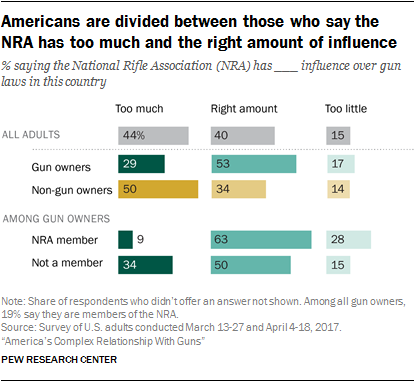
For their part, NRA members are largely satisfied with the amount of influence the organization has over gun laws in the U.S. About six-in-ten (63%) say the NRA has the right amount of influence and 28% say it has too little influence. Only 9% of NRA members say the organization has too much influence over gun laws. Among non-gun owners, 50% view the NRA as too influential.
Gun owners are more likely than non-gun owners to have ever contacted a public official to express their opinion on gun policy. About one-in-five gun owners (21%) say they have done this, compared with 12% of non-gun owners.
The remainder of this report examines in greater detail the public's experiences with guns as well as views on gun policies. Chapter 1 looks at the demographics of gun ownership and the reasons people own guns. It also explores early experiences with guns, such as growing up in a gun-owning household and participating in hunting or sport shooting. Chapter 2 focuses on the role guns have in the daily life of gun owners, including whether they carry a gun outside their home, how often they engage in gun-related activities or consume gun-oriented media, and their social ties to other gun owners. It also looks at negative experiences some people have had with guns. Chapter 3 examines the public's views on the responsibilities of gun ownership, with an emphasis on the differences between what gun owners and non-owners consider essential safety measures for gun owners to follow. Chapter 4 explores what Americans see as contributing factors to gun violence. Chapter 5 focuses on the public's views on policy proposals to restrict or expand access to guns.
Unless otherwise specified, "guns" refers to firearms and not to airsoft guns, such as paintball, BB or pellet guns.
"Gun owners" are those who say they personally own one or more guns. "Non-owners who live in a gun-owning household" are those who say they do not personally own any guns, but someone else in their household does.
Those who did not grow up with guns in the home includes those who say, as far as they know, there were never any guns in their household when they were growing up or they are not sure if there were guns in their household when they were growing up.
Those who are said to have children in the household or at home are those who are a parent or guardian to a child younger than 18 who lives in their household.
References to college graduates or people with a college degree comprise those with a bachelor's degree or more. "Some college" refers to those with a two-year degree or those who attended college but did not obtain a degree. "High school" refers to those who have attained a high school diploma or its equivalent, such as a General Education Development (GED) certificate.
References to whites and blacks include only those who are non-Hispanic and identify as only one race. Hispanics are of any race.
All references to party affiliation, excluding one reference in chapter 1, include those who lean toward that party: Republicans include those who say they lean toward the Republican Party and Democrats include those who say they lean toward the Democratic Party.
References to adults who live in an urban, suburban or rural area are based on an analysis that takes into account the density of the area where they live based on their address or the location of their telephone number or their ZIP code if they didn't provide an address. For a more detailed explanation of how community type was coded, see the Methodology section of the report.
galesdevescithhen.blogspot.com
Source: https://www.pewresearch.org/social-trends/2017/06/22/americas-complex-relationship-with-guns/
0 Response to "Get a Gun is More Easy That Get a House"
Post a Comment